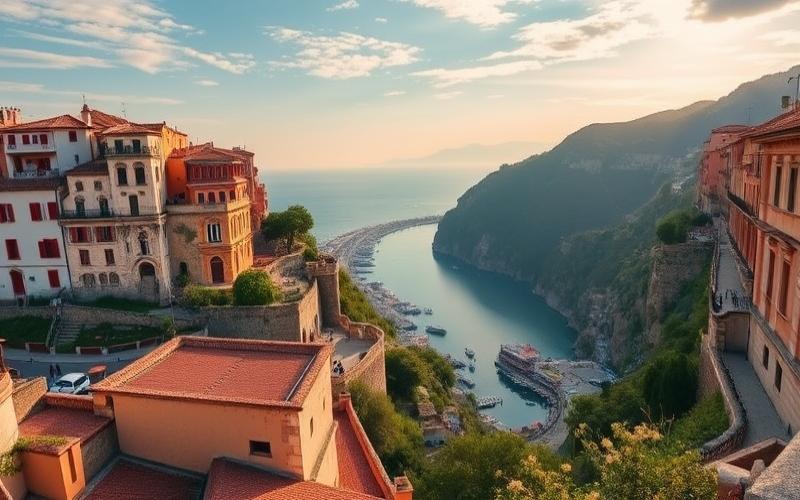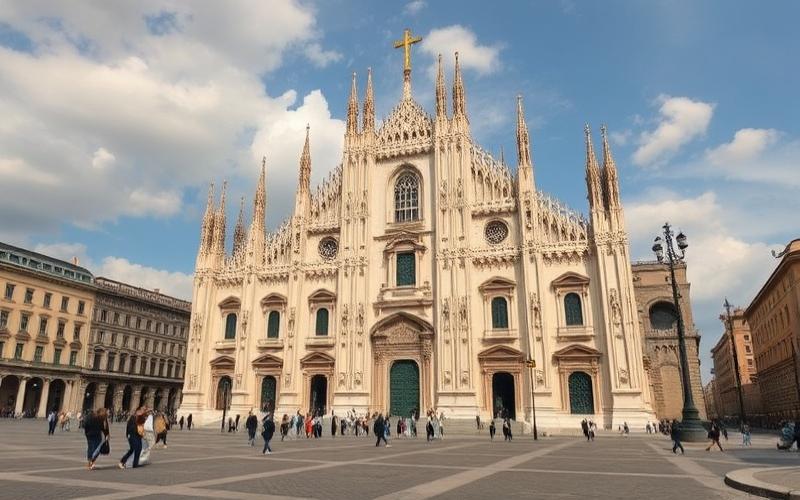
 Published on and written by Cyril Jarnias
Published on and written by Cyril Jarnias
Italy, with its enchanting landscapes, rich history, and incomparable culture, attracts millions of tourists from around the world every year. This steady influx presents a golden opportunity for real estate investors and property owners looking to venture into seasonal rentals. Let’s explore together why Italy has become a prime destination for this type of investment and how you can benefit from it.
The Sweet Life of Seasonal Rentals
A Thriving and Promising Market
Seasonal rentals in Italy have experienced a real boom in recent years. This phenomenon can be explained by several factors:
- Consistently increasing tourist demand
- The diversity of Italian destinations, from the Amalfi Coast to the Tuscan hills
- The appeal of more authentic and personalized travel experiences
According to the latest statistics, the seasonal rental market in Italy has seen 15% annual growth over the past five years. This trend shows no signs of slowing down, offering excellent prospects for investors.
Attractive Potential Income
Property owners who venture into seasonal rentals in Italy can expect attractive returns. On average, a well-located and well-managed property can generate annual income representing 6% to 8% of its value. In the most sought-after areas like Rome, Florence, or the Amalfi Coast, this figure can even reach 10% to 12%.
Take the example of an 80m² apartment in Florence’s historic center. With an average occupancy rate of 70% throughout the year, it can generate gross annual income of approximately €35,000 to €45,000. Of course, these figures vary depending on many factors such as exact location, property quality, and management setup.
Good to Know:
Summer months (June to September) as well as holiday periods are particularly lucrative for seasonal rentals in Italy. It’s therefore crucial to adjust your pricing strategy accordingly.
Keys to Success: Effective Management
The Importance of Professional Management
To maximize income and ensure the longevity of your investment, professional management of your seasonal rental property is essential. Here are the main aspects to consider:
- Marketing and visibility: Ensure optimal presence on online booking platforms
- Guest welcome: Provide quality service to guarantee customer satisfaction
- Maintenance and upkeep: Keep your property in perfect condition to preserve its value
- Reservation management: Optimize occupancy rates throughout the year
Many specialized agencies offer comprehensive management services for owners who wish to delegate these tasks. Although this represents a cost (typically between 20% and 30% of revenue), it often significantly increases the overall profitability of the investment.
The Technological Advantage
Technology plays an increasingly important role in the effective management of seasonal rentals. Tools like smart locks, intelligent thermostats, and automated reservation management systems help optimize costs and improve the traveler experience.
For example, using property management software can save you valuable time by automating many tasks such as calendar synchronization, sending automatic messages to travelers, and generating financial reports.
Good to Know:
Investing in quality equipment and modern technologies can help you stand out from the competition and justify higher rates.
An Evolving Legal Framework
Seasonal rentals in Italy are subject to a regulatory framework that can vary by region and municipality. It’s crucial to research the rules in force in the area where your property is located. Here are some key points to remember:
- Registration: In most regions, it’s mandatory to register your seasonal rental activity with local authorities
- Tourist tax: Many Italian cities impose a tourist tax that you must collect from your travelers and remit to the municipality
- Safety standards: Your property must meet certain safety standards (smoke detectors, fire extinguishers, etc.)
- Duration limits: Some cities, like Florence, have implemented limits on the number of days per year a property can be rented for short-term stays
It’s highly recommended to consult with a specialized lawyer or local real estate agency to ensure you comply with all current regulations.
Taxation, an Aspect Not to Overlook
In Italy, income from seasonal rentals is subject to income tax. Property owners have two options:
1. The ordinary regime: Income is declared and taxed according to the progressive income tax scale.
2. The “cedolare secca”: A flat tax rate of 21% (or 10% in certain areas) applies to gross income.
The choice between these two options will depend on your personal situation and the amount of your rental income. It’s advisable to consult an accountant to determine the most advantageous solution for you.
Good to Know:
If you are not an Italian tax resident, specific rules apply. Make sure you understand your tax obligations in both your country of residence and Italy.
Prime Destinations for Seasonal Rentals in Italy
The Must-Haves
Certain Italian regions and cities particularly stand out for seasonal rentals:
- Rome: The eternal capital attracts millions of visitors each year, offering almost constant rental potential
- Florence: The cradle of the Renaissance attracts art and history enthusiasts from around the world
- Venice: Despite challenges related to overtourism, the city of the Doges remains a highly sought-after destination
- Tuscany: Tuscan villas and country houses are particularly sought after for longer stays
- The Amalfi Coast: This region offers high-end rental opportunities with breathtaking views
Emerging Destinations
Beyond these classics, new destinations are gaining popularity among travelers seeking authenticity:
- Apulia: This southern Italian region is attracting more and more visitors with its beautiful beaches and picturesque villages
- Sicily: The island offers a unique blend of culture, history, and spectacular landscapes
- The Dolomites: This mountainous region is popular both in winter for skiing and in summer for hiking
Investing in these emerging areas can offer excellent value for money and interesting growth potential for the future.
Good to Know:
Geographic diversification of your seasonal rental investments can help reduce risks and optimize your income throughout the year.
Preparing Your Investment: Key Steps
Thorough Market Research
Before purchasing a property for seasonal rental in Italy, it’s crucial to conduct thorough market research. Here are the essential points to analyze:
- Tourist demand in the target area
- Average rates for similar properties
- Average annual occupancy rate
- Regional development prospects (new airports, tourist attractions, etc.)
This information will allow you to accurately assess the profitability potential of your investment.
Choosing the Right Property
The success of your seasonal rental will largely depend on your choice of property. Here are some criteria to consider:
- Location: Prioritize areas close to tourist attractions or offering exceptional settings
- Accessibility: Ensure your property is easily accessible from major airports or train stations
- Unique character: Look for properties with particular charm (panoramic views, typical architecture, etc.)
- Renovation potential: A property requiring some work can offer a great opportunity for added value
Don’t hesitate to use a local real estate agent specialized in seasonal rentals to assist in your search.
Good to Know:
Historical properties or those offering unique experiences (trulli in Apulia, masserie in Sicily, etc.) often have strong potential for seasonal rentals.
Maximizing Your Profitability: Tips and Strategies
Creating a Unique Experience
To stand out in an increasingly competitive market, it’s essential to offer your guests a memorable experience. Here are some ideas to achieve this:
- Careful decoration blending traditional Italian elements with modern comfort
- Providing a personalized guide with your best local recommendations
- Partnerships with local providers to offer additional services (cooking classes, guided tours, etc.)
- Attention to detail: quality welcome products, high-end linens, etc.
These small touches will help generate positive reviews and build customer loyalty.
Optimizing Your Pricing Strategy
Dynamic pricing is crucial for maximizing your income. Here are some principles to apply:
- Adjust your rates according to seasons and local events
- Offer discounts for long stays, especially during low season
- Use market analysis tools to remain competitive while maximizing your income
- Offer attractive rates for first bookings to quickly generate positive reviews
Don’t hesitate to test different pricing strategies to find what works best for your property.
Good to Know:
Flexibility is key in managing a seasonal rental. Be prepared to adjust your strategy based on guest feedback and market evolution.
Conclusion: A Promising Investment, But Not Without Challenges
Seasonal rentals in Italy offer attractive opportunities for real estate investors. With a flourishing tourist market, attractive potential returns, and a diversity of destinations to explore, Italy positions itself as a prime destination for this type of investment.
However, succeeding in this field requires a professional and thoughtful approach. Effective management, thorough knowledge of local regulations, and a well-planned marketing strategy are essential to get the most out of your investment.
By venturing into seasonal rentals in Italy, you’re not simply investing in real estate. You’re offering your guests the opportunity to experience the Italian sweet life, while building a sustainable and profitable asset.
Remember that each property is unique and success will largely depend on your ability to adapt to local market specifics and the changing expectations of travelers. With patience, creativity, and consistent commitment to service quality, your adventure in Italian seasonal rentals could well become your next financial success.
Disclaimer: The information provided on this website is for informational purposes only and does not constitute financial, legal, or professional advice. We encourage you to consult qualified experts before making any investment, real estate, or expatriation decisions. Although we strive to maintain up-to-date and accurate information, we do not guarantee the completeness, accuracy, or timeliness of the proposed content. As investment and expatriation involve risks, we disclaim any liability for potential losses or damages arising from the use of this site. Your use of this site confirms your acceptance of these terms and your understanding of the associated risks.













































